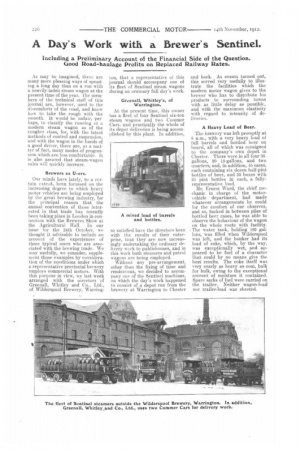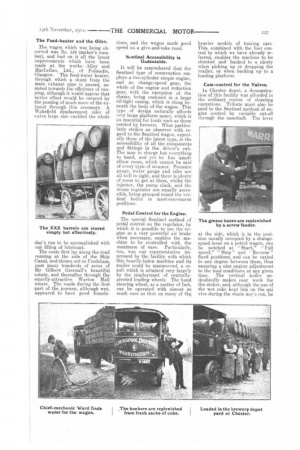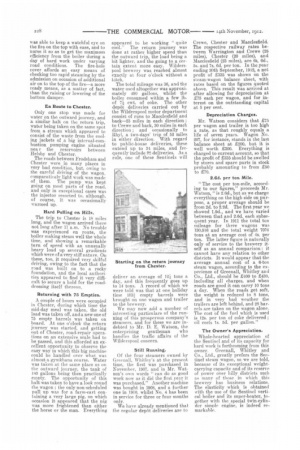A Day' s Work with a Brewer' s Sentinel.
Page 6

Page 7

Page 8

If you've noticed an error in this article please click here to report it so we can fix it.
Including a Preliminary Account of the Financial Side of the Question. Good Road-haulage Profits on Replaced Railway Rates.
As may be imagined, there are many more pleasing ways of spending a long day than on a run with a heavily-laden steam wagon at the present time of the year. The members of the technical staff of this journal are, however, used to the discomforts of the road, and know how to take the rough with the smooth. It would be unfair, perhaps, to classify the running ot modern steam wagon as of the rougher class, for, with the latest methods of control and suspension, arid with the wagon in the hands of a good driver, there are, as a matter of fact, many modes of progression which are less comfortable. It is also assured that steam-wagon sales will quickly increase.
Brewers as U,ers.
Our minds have lately, to a certain extent, been focussed on the increasing degree to which heavy motor vehicles are being employed by the great brewing industry, for the principal reason that the annual convention of those interested in that trade has recently been taking place in London in connection with the Brewers Show at the Agricultural Hall. In our issue for the 24th October, we thought it advisable to include an account of the experiences of three typical users who are associated with the brewing trade. We inay usefully, we consider, supplement those examples by consideration of the conditions under which a representative provincial brewery employs commercial motors. With this purpose in view, we last week arranged with the iiireetors of Greenall, Whitley and Co., Ltd., of Wilderspool Brewery, Warring ton, that a representative of this journal should accompany one of its fleet of Sentinel steam wagons during an ordinary full day's work.
Greenall, Whitley's, of Wa rrington.
At the present time, this owner has a fleet of four Sentinel six-ton steam wagons and two Commer Cars, and practically the whole of its depot deliveries is being accomplished by this plant. In addition, so satisfied have the directors been with the results of their enterprise, that they are now increasingly undertaking the ordinary delivery work to publichouses, and in this work both steamers and petrol wagons are being employed.
Without any pre-arrangement, other than the fixing of time and rendezvous, we decided to accompany one of the Sentinel maehines, on which the day's work happened to consist of a depot run from the brewery at Warrington to Chester and back. As events turned out, this served very usefully to illustrate the facilities which the modern motor wagon gives to the brewer who has to distribute his products to surrounding towns with as little delay as possible, and with the maximum elasticity with regard to intensity of deliveries.
A Heavy Load of Beer.
The brewery was loft promptly at 8 a.m., with a very heavy load of full barrels and bottled beer on hoard, all of which was consigned to the company's own depot in Chester. There were in all four 36gallons, 20 18-gallons, and two quarters, and, in addition, 45 cases, each containing six dozen half-pint bottles of beer, and 35 boxes with 21 pint bottles in each, a fullyrepresentative load. Mr. Ernest Ward, the chief mechanic in charge of the motorvehicle department, had made whatever arrangements he could for the comfort of our observer, and so, tucked in between. piles of bottled beer cases, he was able to observe the behaviour of the wagon on the whole route with facility.
• The water tank, holding 180 gallons, was filled when Wilderspool was left, and the bunker had its load of coke, which, by the way, was exceptionally wet, and appeared to be fuel of a character that could by no means give the best results. The coke itself was very nearly as heavy ascoal, bulk for bulk, owing to the exceptional amount of moisture it contained. Spare sacks of fuel were carried on the trailer. Neither wagon-load nor trailer-load was sheeted. The Feed-heater and the Oiler.
The wagon which was being ohserved was No. bl9 (maker's number), and had on it all the latest improvements which have been made at the works--Alley and MacLellan, Ltd., of Polmadie, Glasgow. The feed-water heater, through which a shunt from the main exhaust pipe is passed, assisted towards the efficiency of running, although it would appear that better effect would be secured by the passing of much more of the exhaust through this accessory. A Wakefield displacement oiler of extra large size enabled the whole
day's run to be accomplished with -one filling of lubricant..
The route first lay along the road running at the side of the Ship Canal, and thence out to Frodsham, past many hundreds of acres of Sir Gilbert Greenall's beautiful estate, and thereafter through the equally-attractive Warton Hall estate. The roads during the first part of the journey, although wet, appeared to have good founda
tions, and the wagon made good speed on a give-and-take road.
Sentinel Accessibility is Undeniable.
It will be remembered that the Sentinel type of construction em
ploys a two-cylinder simple engine, and no change-speed gear, the whole of the engine and reduction gear, with the exception of the chains, being enclosed in a large oil-tight casing, which is slung be neath the body of the wagon. This type of design naturally affords very large platform space, which is an essential for loads such as those carried by brewers. What particularly strikes an observer with regard to the Sentinel wagon, especially those of the latest type, is the accessibility of all the components and fittings in the driver's cab. The man in charge has everything to hand, and yet he has ample elbow room, which cannot be said of every type of steamer. Pressure gauge, water gauge and oiler are all well in sight, and there is plenty of room to get at them, whilst the injector, the pump clack, and the steam regulator are equally accessible, being grouped round the vertical boiler in most-convenient positions.
Pedal Control for the Engine.
The special Sentinel method of pedal control on the regulator, by which it is possible to use the engine as a very powerful air brake when necessary, enables the machine to be controlled with the maximum of ease. Particularly, too, was our representative impressed by the facility with which this heavily-laden machine and its trailer could be manceuvred, a result which is attained very largely by the employment of centrallypivoted leading wheels. The hand steering wheel, as a matter of fact, can be operated with almost as much ease as that on many of thq heavier models of touring cars. This, combined with the foot control-to which we have already referred, enables the machine to be shunted and backed to a nicety when picking up or dropping the trailer, or when backing up to a loading platform.
Cam-control for the Valves.
In Chester depot, a demonstration of this facility was afforded in the ordinary course of shunting operations. Tribute must also be paid to the Sentinel method of engine control by variable cut-off through the camshaft. The lever
at the side, which is in the position usually occupied by a changespeed lever on a petrol wagon, can be notched at "Start," "Full speed," " Stop" and .; Reverse" fixed positions, and can be varied to any degree between them, thus ensuring a nice engine adjustment to the load conditions at any given time. The vertical boiler undoubtedly makes easy work for the stoker, and, although the use of the wet coke kept him on the qui vive during the whole any's run, he was able to keep a watchful eye on the fire on the top with ease, and to nurse it so as to get the maximum efficiency from the boiler during a day of hard work under varying road conditions. The fire-hole cover affords an easy means of checking too rapid steaming by the admission on occasion of additional air on to the top of the fire—a more ready means, as a matter of fact, than the raising or lowering of the bottom damper.
En Route to Chester.
Only one stop was made for water on the outward journey, and a similar halt on the return trip, water being taken on the same spot. from a stream which appeared to consist of the waste from the cooling jackets of a big internal-combustion pumping engine situated nea,r the reservoirs between Helsby and Chester.
The roads between Erodsham and Chester were in many places in very bad condition, but, owing to the careful driving of the wagon, comparatively light work was made of . them. The pump was kept going on most parts of the road, and only in exceptional cases was the injector resorted to, although, of course, it was occasionally warmed up.
Hard Pulling on Hills.
The trip to Chester is /8 miles long, and the wagon arrived there not long after 11 a.m. No trouble was experienced en route, the boiler making steam well the whole time, and showing a remarkable turn of speed with an unusually heavy load up several gradients which were of a very stiff nature. On these, too, it required very skilful driving, owing to the fact that the road was built on to a rocky foundation, and the local authorities appeared to find it very difficult to secure a hold for the roaddressing itself thereon.
Returning with 75 Empties.
A couple of hours were occupied in Chester, during which time, the mid-day meal was taken, the old load was taken off, and a newone of 75 empty barrels was taken on board. At one o'clock the return journey was started, and getting out of Chester, road-repair operations on an extensive scale had to be passed, and this afforded an excellent opportunity to observe the easy way in which this big machine could be handled over what was almost a gymkhana course. Water was taken at. the same place as on the outward journey, the tank of 180 gallons being then practically ennoty. The opportunity of this halt was taken to have a look round the wagon ; the only non-scheduled pull up was for a farm-cart containing a very large pig, on which occasion it appeared that the nig was more frightened than either the horse or the man. Everything appeared to be a orking "quite cool." The return journey was done at rather higher speed than the outward trip, the load being a bit lighter, and the going to a certain extent more easy. Wilderspool brewery was reached almost exactly at four o'clock without a hitch.
The total mileage was 36, and the water used altogether was approximately 490 gallons, whilst the holler consumed within a few lb. of 7i cwt, of coke. The other depot deliveries carried out by the Wilderspool motor department consist of runs to Macclesfield and back-23 miles in each direction ; to Crewe and back, 30 miles in each direction ; and occasionally to Rhyl, a two-days trip of 52 miles in either direction. With regard to public-house deliveries, these extend up to 3..t miles, and frequently include 2S.,, deliveries. As a rule, one of these Sentinels will
deliver an average of 12;;,tons a day, and this frequently goes up to 14 tons. A record of which we were told was that at one holiday time 103 empty barrels were brought on one wagon and trailer to the brewery. We may now add a number of interesting particulars of the running of this prosperous company's steamers, and for these we are indebted to Mr. D. E. Watson, the g enterprising entleman who handles the traffic affairs of the Wilderspool concern.
Still Running.
Of the four steamers owned by Greenall, Whitley's atthe present time, the first was purchased in November, 1907, and in Mr. Watson's own words " can do as good work now as it did the first year it was purchased." Another machine was bought in 1908, and a further one in 1910, whilst No. 4 has been in service for three or four months only. We have already mentioned that the regular depot deliveries are to Crewe, Chester and Macclesfield, The respective railway rates between Warrington and Crewe (28 miles), Chester (20 miles), and Macclesfield (23 miles), are 6s. 6d., Sc. and 7s. fid. per ton. In the year ending 30th September, 1012, a net profit of 2335 was shown on the steam-wagon balance sheet, with rates based on the figures quoted above. This result was arrived at after allowing for depreciation at 275 each per wagon, and for interest on the outstanding capital at 5 per cent.
Depreciation Charges.
Mr. Watson considers that 175 per wagon and trailer is too high a rate, as that roughly equals a life of seven years. Wagon No. 207, for instance, stands in the last balance sheet at 1200, but it is well worth £300. Everything is charged to current account, so that the profit of 2.335 should be swelled by stores and spare parts in stock probably amounting to from 250 to 270.
2.U. per ton Mile.
"The cost per ton-mile, according to our figures," proceeds Mr. Watson, "is 2.6d., but as we charge everything on the high side on purpose, a proper average should be from 2d. to 2.21. The first year we showed I.9d., and we have varied between that and 2.6d. each subsequent year. In 1911 the total ton mileage for three wagons was 130,915 and the total weight 7070 tons at an average cost of 4s. per ton. The latter figure is naturally only of service to the brewery itself as an annual comparison : it cannot have any relation to other districts. It would appear that the average annual cost of a 6-ton steam wagon, according to the experience of Greenall, Whitley and Co., Ltd., should be 2400 to 2430, including all charges, and when roads are good it can carry 10 tons a day. When the roads get soft, the weight is reduced to 8 tons, and in very had weather the trailers are left behind, and 28 barrels are taken on the wagon alone. The cost of the fuel which is used is 12s. per ton of coke delivered ; oil costs Is. 5d. per gallon,"
The Owner's Appreciation.
Whole-hearted appreciation of the Sentinel and of its capacity for hard work is forthcoming from this owner. Greenall, Whitley and Co., Ltd., greatly prefers the Sentinel steam wagon, so we are told, because of its exceptional weightcarrying capacity and of its reserve of power over hilly districts such as many of those in which this brewery has business relations. The elasticity which is obtained with the use of the Sentinel vertical boiler and its super-heater, to gether with the special twin-cylinder simple engine, is indeed remarkable.
























